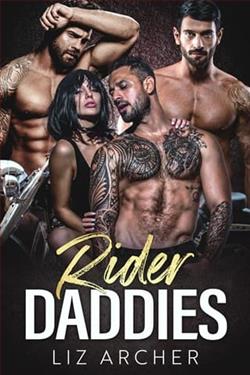Page 1 of Wings
Chapter 1
Wings
TheHarleyrumbledbetweenmy thighs like thunder, a flash of chrome and the threat of violence. Dawn crept across Ironridge's industrial district in shades of rust and diesel exhaust. My prosthetic clicked against the shift lever—a sound I'd never get used to, metal on metal where flesh should be.
It had been a long six ix months.
Six months of prospects runs, of swallowing pride, of proving I could still be useful with parts missing. Today the Heavy Kings decided if I earned my patch or went back to being another broken vet haunting the VA.
The Dyna Super Glide responded to every shift of weight, every minute throttle adjustment. I'd rebuilt her transmission twice, balanced her carbs until she purred. Bikes didn't care about your past. They just needed someone who spoke their language.
I cranked the throttle harder. The Harley surged forward, engine note climbing. Wind whipped past my helmet, but it couldn't blow away ghosts.
Nothing ever would.
Steel Avenue came up fast. The intersection with 42nd was always dicey—delivery trucks, tweakers who'd been up all night, kids late for school. I downshifted, prosthetic foot hovering over the rear brake.
The kid came out of nowhere. Skateboard wheels eating asphalt, earbuds in, hoodie up. He carved hard into the intersection without looking, directly into my path.
Time dilated the way it did in combat. Everything crystallized—the kid's Thrasher magazine sticker, the wear pattern on his Vans, the inevitable physics of our collision. I grabbed brake. Hard.
My prosthetic slipped.
Just a fraction of a second. Carbon fiber on rubber, no nerve feedback to tell me pressure. The foot peg shifted. My weight went wrong. The bike lurched.
Muscle memory saved us both. My right hand crushed the front brake while my left foot—my real foot—stomped the shifter down. The Harley's rear wheel locked up, sliding sideways. Rubber shrieked. The kid's eyes went wide behind scraggly bangs as two thousand pounds of American steel stopped inches from his board.
"What the fuck, asshole!" He flipped me off with both hands, kicked his board up, and rolled away like he hadn't almost become a statistic.
As he rolled out of view, something struck me. He looked so much like Alex.
I hadn’t seen my brother in years, but when I saw that skateboarder, it was like looking at a ghost. I sighed. Didn’t need ghosts this morning. Plus, Alex was alive—last I heard, anyway.
My hands shook inside my gloves. Not from adrenaline—I'd burned through my lifetime supply in Syria. This was something worse. Doubt.
The abandoned Texaco on Riverside beckoned like a confession booth. I pulled in, tires crunching over broken glass and weeds growing through asphalt cracks. The pumps stood like tombstones, prices frozen at $1.89 a gallon, back when the world made more sense.
Helmet off. Deep breaths. The morning air tasted like motor oil and broken promises.
Damn my prosthetic. One second of failure at the wrong moment, and that kid would be bleeding out while his mother got a phone call that destroyed her world.
Not only would it be the end of his life, it might as well be the end of mine.
The Heavy Kings were my last shot at finding another crew, another family. Doc had vouched for me. Duke saw something worth salvaging. Thor tolerated my presence because Duke ordered it. None of them needed a prospect who couldn't keep his bike upright when it mattered.
I strapped my helmet back on. The Harley fired on the first try, eager to run despite my failures. That's what I loved about machines—they didn't judge, didn't pity, didn't care about missing pieces. They just asked if you could do the job.
I pulled into King's Tavern at 0540 hours—twenty minutes early because punctuality was just another form of respect. The parking lot stood empty except for Duke and Thor's Harleys, chrome catching the first light like scattered coins.
Old habits died hard. I backed the Dyna precisely between the yellow lines, front wheel straight, keys in my left pocket wheremy dominant hand could reach them fast. Three tours in Syria had beaten tactical parking into my muscle memory. Always face your exit. Always be ready to move.
The morning carried that particular quiet of a city not quite awake—distant traffic on the interstate, the hum of industrial AC units, a dog barking somewhere in the residential streets beyond the warehouses. My prosthetic made its familiar click-thunk rhythm across the asphalt. Most days I barely noticed it anymore.
Movement caught my peripheral vision. Mrs. Patel from the Mother India restaurant next door wrestled with her garbage bins, all four-foot-eleven of her versus industrial-sized waste containers that probably weighed more than she did. Her pink housedress had seen better decades, and her orthopedic shoes scraped against the concrete as she struggled for leverage.
She hadn't seen me yet. I could walk past, mind my own business, focus on the vote waiting inside the tavern. That's what most prospects would do—keep their heads down, avoid complications.
But I'd watched my mother struggle with heavy loads for too many years to walk past now.















